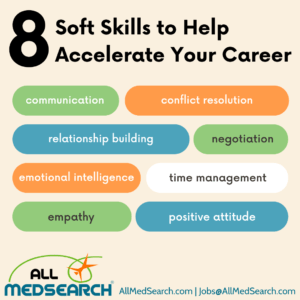
Hard skills get you hired, but soft skills can help get you promoted.
Soft skills are personality traits, interpersonal and behaviors skills that help people work well with others and develop your career. Soft skills are more often seen as personality traits you may have developed rather than hard skills which are typically gained through education, experience, and training.
When applying for a new position, you need your hard skills to help you obtain the position. Hard skills can include language, degrees, certifications, etc. While hard skills are necessary to successfully perform technical tasks, soft skills are necessary to create a positive and functional work environment. Unlike hard skills, soft skills are not easily taught and can help lead to long lasting success during your tenure.
In this article, we will discuss some of the best soft skills to get hired and find long-term success.
Skill 1: Communication
To communicate effectively, try to listen without interrupting, speak with a positive tone, and pay attention to your body language.
Effective communication skills will show your employer that you know how to speak to your colleagues, and potential clients in different situations or settings.
Skill 2: Conflict Resolution
Conflict resolution is the art of addressing those differences and finding common ground that enables everyone to work together peacefully.
To help assist you in your conflict resolution, try avoiding arguments and accusations, focus on solutions over problems, and apologize when it’s your fault.
Skill 3: Relationship Building
Skill 4: Negotiation
There are many situations in the workplace where you may be in the process of negotiations. To be a successful negotiator try listening carefully, understand what the other side wants, know your worth, and finally propose solutions that is going to benefit both sides.
If you are looking on advice on how to negotiate your salary, check out our other blog post.
Skill 5: Emotional Intelligence
Emotional intelligence is most often defined as the ability to perceive, use, understand, manage, and handle emotions. In the workplace, having high emotional intelligence can help improve your job satisfaction.
To help improve your emotional intelligence try to not act impulsively, take a step back when you’re upset, understand what you’re feeling and the consequences of your actions, and then proceed accordingly.
Taking a step back from a stressful situation can help you better assess it and create a more positive outcome for all.
Skill 6: Time Management
Time management skills include a variety of skills that will help you manage your time well.
To successfully manage your time, learn to prioritize tasks, delegate responsibility, and to say no when you have too much on your plate.
Having good time management skills can help you achieve more in the workplace to have a more productive and less stressful day.
Skill 7: Empathy
Empathy can help you in both your professional and personal life. When you are more empathic, you will find it’s easier to communicate and resolve issues.
Here are some ways on how you can be more empathic in the workplace:
- Take a genuine interest in other people.
- Look at things from their perspective.
- Acknowledge other peoples feelings.
- Never judge and always be supportive.
- Be generous with your time and attention.
Empathy can help strengthen your relationships, and emotional intelligence.
Skill 8: Positive Attitude
Attitude is important because it can influence your ability to move through the world.
Some tips of how to remain positive in the workplace are to never gossip, never complain, criticize sparingly, and always speak well of others.
Soft skills will make you the kind of employee companies want to hire, keep and promote. It is very important to highlight the soft skills you have at all stages of your job search, and continue developing your soft skills once you have found a new position. Your attitude reflects your work personality and work ethic. You do not want to give off the wrong idea to interviewers, colleagues, and superiors. A negative outlook on your previous employers or life in general can leave people with a poor first impression of yourself, and doors will close as a result. Speaking poorly of others and complaining behind their backs can come back to haunt you. Being negatively critical of things both in and out of your control will scare people away.
All Med Search offers tons of resources to help you throughout your job search. Talk to us today to find you a job that will help you achieve the next step in your career goals. Marni@AllMedSeach.com
